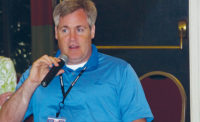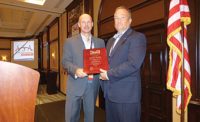Best practices panel discussions highlight 2013 SWA Convention
The floor is yours.

From left: Bob Christiansen (Chris More, Inc.), David Popek (VAMAC), A.J. Maloney (Coburn Supply) and Pace Robinson (Modern Supply) listen to an audience member during the distributor best practices panel discussion at the 2013 SWA Convention on Hilton Head Island, S.C.Photo by Mike Miazga/Supply House Times

The 85th annual SWA Convention was held at the Marriott Resort & Spa on Hilton Head Island. This year’s event attracted more than 500 people. Photo by Mike Miazga/Supply House Times

SWA Executive Vice President Terry Shafer addresses attendees at the 2013 SWA Convention. Shafer noted SWA’s sponsorships are at an all-time high and participation in the Leadership Development Council has increased 20%.Photo by Mike Miazga/Supply House Times



Last year, Southern Wholesalers Association conducted a pair of best practices panel discussions at its annual convention that featured distributors and manufacturers discussing hot-button industry topics.
The sessions were back on the docket and once again were a big hit at the 85th annual SWA Convention held at the Marriott Resort and Spa on Hilton Head Island, S.C.
This year’s convention attracted 512 attendees, an increase from last year’s Tropical Storm Debby-soaked Panama City Beach, Fla., event that drew 455 people.
“Our sponsorships are at a 10-year high and we had a lot more manufacturers reps in attendance this year,” SWA Executive Director Terry Shafer told Supply House Times at the event. “We’re seeing companies bring more people every year to the convention. We have some new wholesale and manufacturer members and our Leadership Development Council (SWA’s young leaders arm) has grown by 20% this year. That’s the future of our organization. We’re very pleased.”
This year’s manufacturers’ best practices panel featured Michael Werner (Globe Union), Billy Zimmerman (Charlotte Pipe), Jim McGoldrick (Bradford White), Tom Bush (NIBCO) and Ken Roberts (Delta Faucet).
Incoming SWA President and panel moderator Coley Herrin (Plumbing Distributors Inc.) kicked off the manufacturers’ portion by asking about the forthcoming reduction in lead law that goes into effect Jan. 4, 2014.
Panel members described what their companies are doing to prepare for the new law. Werner stressed the need to term products “low lead” instead of “lead-free” or “no lead.” Panel members also discussed the possibility of a black market developing for remaining product that exceeds the new standard.
Along the same lines, several panel members expressed frustration over increasing government regulations in recent times. McGoldrick mentioned the water heater industry is preparing for new Department of Energy legislation that mandates higher energy efficiency standards for water heaters beginning in April 2015.
“With respect to its impact on product development and our customers, we view our biggest competition as the federal government and not our direct competitors in the marketplace,” he said. “We don’t see regulation slowing down anytime soon.”
Some other topics broached during the manufacturers’ panel included hiring quality workers and production capacity.
In terms of finding quality workers, Zimmerman noted Charlotte Pipe has enjoyed success recruiting employees with military backgrounds. “It’s a proven resource that companies should tap into,” he said. “I would encourage it.”
Another interesting discussion centered around the role the Internet is playing in the supply chain. Werner noted there is tremendous growth potential with integration of the Internet, but stressed there always will be a need for local supply houses and showrooms (for more on this topic read John McNally’s story here add a link to the Adjust and adapt feature).
“If a customer is remodeling a bathroom, it’s not so easy to buy a whole bathroom on the Internet,” Werner said.
Bush feels the customer-wholesaler direct relationship will ultimately win out. “This is still a relationship-based business,” he said. “As long as there is a demand for product and a demand for service, the wholesaler is sitting pretty good. Access to product locally has tremendous value and can’t be replaced by the Internet.”
The wholesaler best practices panel featured A.J. Maloney (Coburn Supply), Pace Robinson (Modern Supply), David Popek (VAMAC) and Bob Christiansen (Chris More, Inc.).
Topics with this panel included dead inventory, the new low-lead law, health-care reform, changes companies have made coming out of the recession, Internet sales, credit lines for customers and the state of buying groups.
“Buying groups are a pretty important part of our industry landscape and will continue to play an important part,” Maloney said. “It’s the way all of us independents have been able to survive in this economy.”
The panel agreed wholesalers need to continue to take active roles with government-related initiatives. “If the lead law is not a point for advocacy, I don’t know what is?” Robinson asked. “We all need to be involved.”
During the tail end of the session, the panel was asked if they received a fair price for their business, would they sell and still stay involved in the industry.
“I would stay,” Christiansen said. “This is a tough business and not one where you work 9-to-5 and then leave it on the table. It’s 24-7. I’ve made a lot of great relationships and friendships through the years. I love the whole industry.”
Maloney added: “There are always going to be trials and tribulations, but it’s still a fun business. I’ve always said if I get up and don’t want to go to work, I probably won’t. I still get up and go. It’s a great industry.”
Health-care update
On the topic of health care, National Association of Wholesaler-Distributors Vice President-Governmental Relations Jim Anderson talked to SWA attendees about the implementation of the Affordable Care Act. A delay recently was announced regarding businesses complying with the new health-insurance mandates. Businesses with 50 or more employees now have until 2015 to show proof of providing insurance for their employees (or that employees have insurance through another source).
Anderson’s message to the assembled audience regarding the Affordable Care Act was simple and to the point.
“Plan accordingly,” he said. “If you haven’t already done it, get with your legal, financial and employee benefits advisors sooner rather than later. This is an enormously complicated act. It’s so complicated regulators in Washington have a difficult time with it. Like it or not, the Affordable Care Act is here to stay.”
University of Toronto Economics Professor David Foot was the convention’s keynote speaker and presented an entertaining and informative presentation on changing demographics and how they factor into business.
“Using demographics for business purposes is very underutilized,” Foot said in a video interview with Supply House Times. “People do look at demographics, but it’s from a societal point of view. They don’t look at it from a business point of view.”
Foot emphasized the words boom, bust and echo, which he noted represent the three current generations in the workforce.
“(The generations) are workers and understanding the generational differences from a working point of view is great,” he said. “They also are your ultimate customers. It’s important to understand their life cycle and how they spend their money. In the very short term, the economy dominates. If you move out three, five and 10 years down the road, demographics play an increasingly important function for any organization.”
Current SWA President Harry Hays and ASA President Jeff Pope delivered speeches prior to Foot taking the stage. SWA’s officers for 2013-2014 were introduced. Hays moves into the chairman of the board position, while Herrin becomes the 63rd president in SWA history (See a profile on Herrin here). Travis Elrod (Devore & Johnson) is now first vice president and treasurer and Brendan Donohue (Cregger Co.) moves into the second vice president position. Herrin is SWA’s first president to come through the Leadership Development Council.
The Leadership Development Council hosted a lunch meeting led by LDC Executive Committee members Luke Larkin (South Atlanta Winnelson) and Zach Hudgins (White Wolf Group), while the Supplier’s Advisory Council once again brought together the SWA Executive Committee with SWA member manufacturers and rep agencies to share ideas and suggestions in a lunch setting. The convention’s conclusion featured the traditional closing party and golf awards ceremony.
Shafer also was pleased with spouse and children attendance at the family-themed convention. This year’s event attracted 140 spouses and 98 kids.
“Our kids program has grown tremendously,” he said. “We’re seeing a lot of people make the convention a family vacation. There are kids who are pen pals during the year and see each other at our events and then ask dad where they are going next year. The depth and breadth of the relationships between the manufacturers and the wholesalers grow considerably when the spouses and kids get to know each other.”
The 2014 convention takes place June 21-24 at Hammock Beach Resort in Palm Coast, Fla.
HELPFUL LINKS:
Looking for a reprint of this article?
From high-res PDFs to custom plaques, order your copy today!





